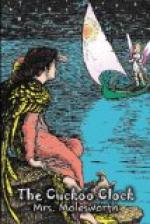I suppose it was with working so hard at her lessons—most people would say it was with having been up the night before, running about the house in the moonlight; but as she had never felt so “fresh” in her life as when she got up that morning, it could hardly have been that—that Griselda felt so tired and sleepy that evening, she could hardly keep her eyes open. She begged to go to bed quite half an hour earlier than usual, which made Miss Tabitha afraid again that she was going to be ill. But as there is nothing better for children than to go to bed early, even if they are going to be ill, Miss Grizzel told her to say good-night, and to ask Dorcas to give her a wine-glassful of elderberry wine, nice and hot, after she was in bed.
Griselda had no objection to the elderberry wine, though she felt she was having it on false pretences. She certainly did not need it to send her to sleep, for almost before her head touched the pillow she was as sound as a top. She had slept a good long while, when again she wakened suddenly—just as she had done the night before, and again with the feeling that something had wakened her. And the queer thing was that the moment she was awake she felt so very awake—she had no inclination to stretch and yawn and hope it wasn’t quite time to get up, and think how nice and warm bed was, and how cold it was outside! She sat straight up, and peered out into the darkness, feeling quite ready for an adventure.
“Is it you, cuckoo?” she said softly.
There was no answer, but listening intently, the child fancied she heard a faint rustling or fluttering in the corner of the room by the door. She got up and, feeling her way, opened it, and the instant she had done so she heard, a few steps only in front of her it seemed, the familiar notes, very, very soft and whispered, “Cuckoo, cuckoo.”
It went on and on, down the passage, Griselda trotting after. There was no moon to-night, heavy clouds had quite hidden it, and outside the rain was falling heavily. Griselda could hear it on the window-panes, through the closed shutters and all. But dark as it was, she made her way along without any difficulty, down the passage, across the great saloon, in through the ante-room door, guided only by the little voice now and then to be heard in front of her. She came to a standstill right before the clock, and stood there for a minute or two patiently waiting.
She had not very long to wait. There came the usual murmuring sound, then the doors above the clock face opened—she heard them open, it was far too dark to see—and in his ordinary voice, clear and distinct (it was just two o’clock, so the cuckoo was killing two birds with one stone, telling the hour and greeting Griselda at once), the bird sang out, “Cuckoo, cuckoo.”
“Good evening, cuckoo,” said Griselda, when he had finished.
“Good morning, you mean,” said the cuckoo.




